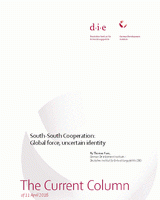South-South Cooperation: Global force, uncertain identity
Fues, ThomasThe Current Column (2016)
German Development Institute / Deutsches Institut für Entwicklungspolitik (DIE) (The Current Column of 11 April 2016)
Bonn, 11 April 2016. In March, India hosted the second global conference on South-South Cooperation (SSC) in Delhi. Compared to its predecessor in April 2013, Delhi2 demonstrated the rapid evolution of SSC as an important modality in international development cooperation. Rising powers in the South, such as China, India, Brazil, Indonesia, South Africa and Mexico, are now ready to play a pro-active part in collective action on the Sustainable Development Goals, the Financing for Development Addis Agenda and the Paris Agreement on climate change.
However, uncertainties about the nature and direction of SSC remain since discourses and practices in the South have not yet converged on a common narrative. Concepts and definitions are still vague and contested. Methodologies for reporting and impact assessment are just in their infancy. In order for SSC to realise its full potential, Southern governments would need to institutionalise mechanisms for transparency, accountability and knowledge creation. Progress on such challenges is of critical relevance for the world at large. With SSC evolving as an effective resource of international solidarity, Southern providers could complement North-South Cooperation and nudge traditional donors towards a stronger commitment for global sustainable development.
Blurred contours
SSC has significantly grown in volume, economic leverage and political weight over recent years. However, policymakers and scholars in the South have not yet arrived at a common understanding of what it actually means. Some, for example officials in Latin America and China, focus on the provision of public funds to fellow developing countries – similar to what would be traditionally called „aid“. Others, like the Indian government, insist on a more comprehensive interpretation of SSC. They would like to include technology transfer, trade facilitation, peace operations as well as private investment and loans. With similar reasoning, Northern donors have recently widened their concept of external assistance by introducing a new category of “Total Official Support to Sustainable Development“ which encompasses private transactions in addition to public transfers.
Among the providers of SSC, Latin America stands out for its unified approach. The Ibero-American General Secretariat publishes annual assessments of SSC by Latin American governments based on common definitions and reporting modalities. However, the scope of SSC in this exercise is limited to technical cooperation among governments. The Latin American proposal to use their framework as a starting point for a global SSC report has been frustrated by Asian governments. They feel that the diversity of SSC approaches does not allow for joint monitoring at this stage.
Up to now, the South has not been able to establish an effective platform for dialogue and experience sharing. The loose consortium of around 20 SSC providers which came together at the 2013 Delhi conference has not produced tangible results, due to divergent concepts of SSC. While paying much attention to SSC, the United Nations has not been able to overcome such divisions. The UN Development Cooperation Forum has consistently highlighted SSC in its work, but did not attract much interest from the South.
Can NeST be home?
An influential driver of convergence for SSC concepts and methodologies has emerged with the newly established Network of Southern Think Tanks (NeST). The creation of this network was proposed at a Beijing workshop of the United Nations Development Programme in March 2014. It took further shape at the sidelines of the Mexico meeting of the Global Partnership for Effective Development Cooperation later in the year. NeST fully stepped onto the international stage at the 2016 Dehli conference on SSC. Key actors in NeST are think tanks from India, China, Brazil and South Africa. They have developed a methodological framework for SSC reporting and impact assessment which is presently being tested through case studies in China and Brazil.
Which way forward?
At this moment, South-South Cooperation cannot realize its full potential as a collective force due to a lack of cohesion among Latin America and Asian providers. Only if the South arrives at a shared understanding of concepts, purposes and definitions, will SSC be able to contribute fully to the Sustainable Development Goals, the Addis Agenda and the Paris Agreement. In light of the requirements for global transformation towards comprehensive sustainability, Southern governments need a fresh approach in balancing national interests and international solidarity, just like the North. In this, the South needs to nurture domestic think tanks and strengthen their capabilities for joint knowledge creation and policy advice.

